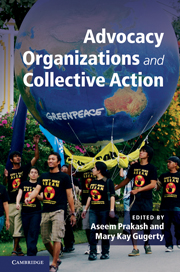Book contents
- Frontmatter
- Contents
- Figures and tables
- Contributors
- Preface
- Acknowledgments
- 1 Advocacy organizations and collective action
- Part 1 The institutional environment and advocacy organizations
- Part 2 Advocacy tactics and strategies
- Part 3 International advocacy and market structures
- Part 4 Toward a new research program
- 11 Rethinking advocacy organizations? A critical comment
- 12 Conclusions and future research
- Index
- References
11 - Rethinking advocacy organizations? A critical comment
Published online by Cambridge University Press: 05 June 2012
- Frontmatter
- Contents
- Figures and tables
- Contributors
- Preface
- Acknowledgments
- 1 Advocacy organizations and collective action
- Part 1 The institutional environment and advocacy organizations
- Part 2 Advocacy tactics and strategies
- Part 3 International advocacy and market structures
- Part 4 Toward a new research program
- 11 Rethinking advocacy organizations? A critical comment
- 12 Conclusions and future research
- Index
- References
Summary
Over the past fifteen to twenty years, the study of transnational advocacy networks, of NGOs, and other such groups has blossomed. While the original focus was mostly on the policy effects and consequences of such groups (do they matter?), more recent work has started treating them as ordinary organizations emphasizing their internal organizational structures, their material and immaterial resources, and their strategies from a variety of perspectives. This volume is part and parcel of this scholarly effort. It attempts to outline a “new agenda for the study of advocacy organizations” (Prakash and Gugerty, Chapter 1) by treating them analogously to firms and using a collective action perspective to get a fuller understanding of their emergence and structure as well as their tactics and strategies. In doing so, the authors try to move away from and criticize a perspective which sees advocacy groups as primarily motivated by principled beliefs (e.g. Keck and Sikkink, 1998). One of the authors calls this the “moral theory” of advocacy groups (Bob, Chapter 5) and points to some alleged anomalies of such a theory. The editors of this volume view “advocacy NGOs as special types of firms which function in policy markets” (Prakash and Gugerty, Chapter 1).
It speaks to the editors’ intellectual honesty and rigor that they have asked me to provide a critical comment to their endeavor from somebody who has tried to contribute to the original advocacy network literature (e.g. Risse, Ropp, and Sikkink, 1999). I am happy to offer my reading of the volume’s findings in the following. First, I argue that the collective action perspective complements the original advocacy network literature in important ways, but does not challenge it. Second, I find that the collective action perspective on advocacy organizations indeed sheds some new light on old questions. However, most of it is consistent with claims put forward by the earlier literature. Third, I suggest that one should not overdo the firms analogy with regard to NGOs, since some fundamental differences remain which a constitutive analysis demonstrates. The findings of this volume actually confirm rather than challenge this view. Finally, I turn the analogy around and ask what we can learn if we treat firms as norm entrepreneurs.
- Type
- Chapter
- Information
- Advocacy Organizations and Collective Action , pp. 283 - 294Publisher: Cambridge University PressPrint publication year: 2010
References
- 6
- Cited by



